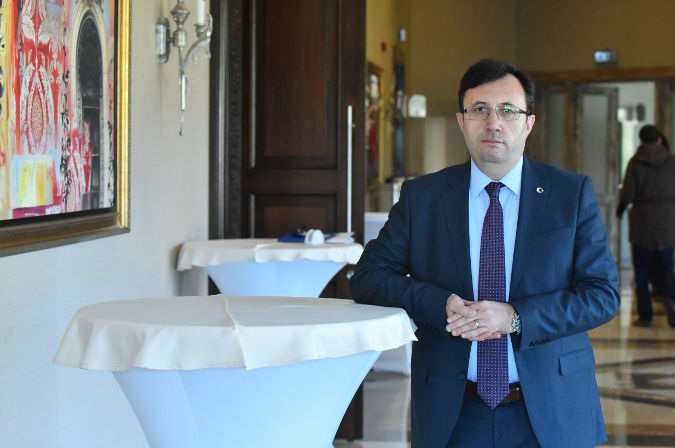Take Five: “Gender-responsive budgeting is a crucial tool for gender equality”
Date:

Naim Çoban is the Head of the Strategic Development Department that operates under the Administrative Department in the Turkish Parliament. Administrative Department provides administrative and technical support to the General Assembly, committees, political party groups, and members of parliament. For the past few years, under the supervision of Administrative Department, Strategic Development Department is working on mainstreaming gender equality and gender-responsive budgeting in the parliament. UN Women provides technical expertise in exploring possible measures to enhance a gender- responsive parliamentary budget.
What work on gender-responsive budgeting has been done to date in Turkish Grand National Assembly (TGNA) with technical assistance from UN Women?
I believe that we have achieved a significant level of awareness with the project. We organized several trainings, workshops and awareness raising activities on gender-responsive budgeting (GRB) for the senior administration in TGNA, the staff of Administrative Department, and budgeting experts from the ministries and public institutions.
With the ownership and support of the senior administration, GRB was added as an article to the Administrative Department’s Budget Call for 2018, which is a statement issued by the Administration to guide the budget proposals and preparation of the investment programmes. We stated that GRB approach would be considered when preparing budget proposals. In the budget discussions with TGNA departments, we reviewed whether GRB was taken into consideration during budgeting.
Moreover, Administrative Department included performance indicators on gender equality and GRB in the 2018-2022 Strategic Plan. We had the opportunity to clearly see that budgeting work would have different impact on women and men.
What impact do you aim to create on gender equality in TGNA Administrative Department through GRB work?
I believe that GRB is indeed a crucial tool for gender equality. When planning the Administration’s activities, we have started to plan in consideration of different needs, preferences and rights so that women and men can equally benefit from the activities. Our most important goal is to raise awareness on GRB, and equip all our staff with gender equality perspective.
What steps need to be taken to make GRB a priority in public agencies’ annual budgets, plans and programmes?
Since gender-responsive indicators are to be produced particularly on gender-responsive data and statistics, I think that the institutions engaging in GRB work should prioritise data and statistics. We have achieved awareness through our institutional practice.
It is essential to integrate GRB in public agencies’ strategic plans, budgeting processes, performance monitoring and reporting processes, and strengthen its applicability.
Another important step is to augment efforts to raise awareness in public administrations within the central government and share good practices. The EOC has assumed an important mission and been cooperating with other committees, including particularly the Plan and Budget Committee. Particularly the exemplary work by the EOC in collaboration with the Ministry of Family, Labour and Social Services will guide our public agencies.
What impact will the budget call by TGNA Administrative Department have in the 2019-2021 period?
Our budget call of 2015 stated for the first time that “Gender Equality Approach” and “Gender Budgeting” should be considered in preparing budget proposals. In the budget call of 2018, we asked departments to budget activities and projects for gender equality.
In this context, five activities and projects on awareness and infrastructure were budgeted in the budget of 2019. Our Department of Human Resources started to deliver gender equality awareness trainings to all new recruited staff. Gender equality awareness trainings were delivered to assistant legislative experts and consultants in November 2018. Such awareness trainings can be considered a first concrete output of GRB budgeting. The trainings were delivered by the staff of Administrative Department who had training of trainers. We think that these training of trainers is very valuable in terms of sustainability. We also plan to monitor and evaluate the gender equality activities and projects envisaged in 2019 and report to the senior administration.
How have you collaborated with UN Women to advance the GRB work in the TGNA?
I believe it is important that we, as the Administrative Department, started the GRB work in collaboration with UN Women within the “Gender Equality in Political Leadership and Participation in Turkey” project.
The training and guidance support we received from local and foreign specialist trainers through UN Women contributed greatly to the current state of our work. I would like to take this opportunity to thank UN Women team for their contribution to GRB work at the Administrative Department. We firmly believe that other work of UN Women on gender equality across Turkey has filled a significant gap in this area and contributed to institutional capacity development.
Looking at the examples of GRB work by Administrative Departments of parliaments in other countries, we can see that we are doing very important and valuable work as the country and the Administrative Department. I think however that these practices be made visible and systematically continued, and there is room for improvement by transforming them into a format and documentation. Thus, the GRB Budget Manual that UN Women is preparing is a significant output of the project and it will serve to bridge a significant gap in this area.
Increased technical assistance by UN Women will play an important role on training of trainers in GRB, enhancing institutional capacity and sharing experiences in cooperation with all relevant stakeholders including particularly EOC.